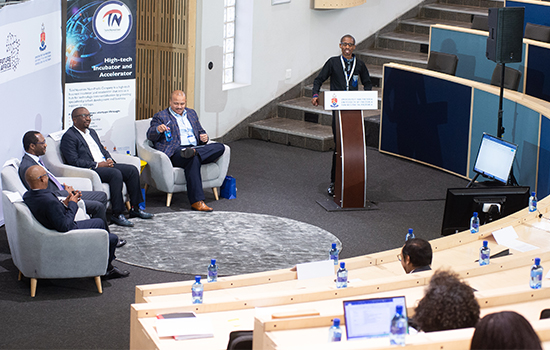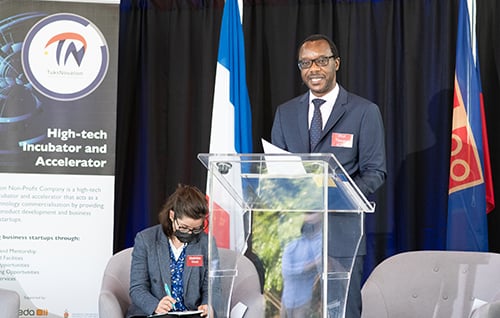By Xolani Mathibela,
The University of Pretoria’s (UP) business incubator TuksNovation has launched the University of Pretoria Vice-Chancellor’s (UPVC) Entrepreneurship Challenge. The launch took place at UP’s Future Africa Institute in association with TuksNovation stakeholders, including the French embassy, and is set to become an annual entrepreneurial event.
The focus of the challenge is to find high-value, commercially viable, high-growth innovations and inventions as well as technology-focused start-ups that can be nurtured into successful businesses. The UPVC Entrepreneurial Challenge is open to students, academics, researchers and entrepreneurs across Africa, including West Africa (Ghana, Nigeria, and Côte d’Ivoire), Southern Africa (South Africa, Botswana and Zimbabwe) and East Africa (Kenya). The challenge is also an opportunity for UP to strengthen existing alliances and form new ones, especially corporate partnerships.
In his opening remarks at the launch, TuksNovation centre manager Phindile Tshabangu said the challenge is looking to unlock entrepreneurship on the African continent and stimulate the ideas of high-tech start-ups to raise the profiles of African-originating technologies.
“TuksNovation aims to drive innovation, attract more funding from existing partners and produce the next generation of entrepreneurs,” he said. “We want to support start-ups to the next stage of their development throughout the start-up lifecycle. What makes this challenge different is that we have shifted the traditional support approach to a venture growth leadership approach, whereby we will support our start-ups on a daily basis to facilitate growth.”
“TuksNovation occupies a special place in the South African entrepreneurship ecosystem,” said UP Vice-Chancellor and Principal Professor Tawana Kupe. “The high-tech start-up ventures supported by TuksNovation specialise in fourth industrial revolution technologies by leveraging the University’s rich, diverse academic and business networks. TuksNovation’s launch was in line with UP’s 2025 vision of an entrepreneurial university.”

From left: Patrick Krappie, Acting CEO of Technology Innovation Agency; Prof Tawana Kupe, UP Vice-Chancellor and Principal; Mduduzi Mbada of the Office of the Premier, Gauteng Provincial Government; and Isaiah Engelbrecht, Divisional Head: Innovation and Knowledge Management at the City of Tshwane, listen to the opening remarks of TuksNovation Centre Manager Phindile Tshabangu (standing at the podium).
The organisation is in its fourth year of operation, and its performance over the years speaks volumes, Prof Kupe added. “Businesses that were supported by TuksNovation have collectively generated revenues of over R20 million,” he said. “TuksNovation onboarded 60 start-ups and trained 1 200 students in entrepreneurship and related entrepreneurial development initiatives.”
The UPVC Entrepreneurship Challenge will culminate with an overall winner, selected from eight categories. There will also be two special categories for social innovation and women-led businesses. Entry categories comprise the following: FinTech, InsureTech, EdTech, AgTech, Big Data, BioTech, HealthTech, and Artificial Intelligence.
The challenge is intended to enhance UP’s position as an African global university, and the awards ceremony is earmarked to coincide with Africa Day on 25 May 2022.
The launch included a panel discussion, during which Isaiah Engelbrecht, Divisional Head of Innovation and Knowledge Management for the City of Tshwane, said that South Africa needs young entrepreneurs and investors to jointly solve the challenges the country faces. “The City of Tshwane is open to partnering with young entrepreneurs because their businesses help to curb unemployment,” he said. “We are interested in partnering with small businesses to help them grow and are hoping that this challenge will promote the success of the ventures.”
“Through our partnership with TuksNovation, we aim to build businesses,” added Patrick Krappie, Acting CEO of the Technology Innovation Agency. “It is not about money, but about solving a much deeper fundamental problem in our system. We hope that these start-ups will be able to produce jobs in the future.”
Read the original article here.

